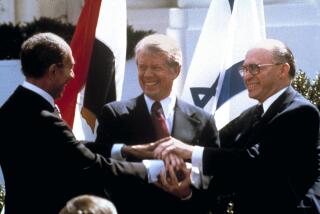Shultz And Soviets to Sign Afghan Pact
- Share via
WASHINGTON — President Reagan announced Monday that he will send Secretary of State George P. Shultz to Geneva to sign on Thursday “historic accords” under which the Soviet Union is to begin withdrawing an estimated 115,000 troops from Afghanistan in May.
The agreement was made possible by “the valiant struggle” of U.S.-backed Afghan rebels “to rid their country of foreign occupation,” said the President, taking time out from a Rose Garden ceremony honoring the men’s and women’s NCAA basketball champions. He said the rebels “can count on our continued support.”
When a reporter shouted to Reagan that the rebels believe they are being sold out by the United States and will not be bound by the pact, the President answered, “We are not.”
Shultz, meeting later with reporters, said the Soviets had rejected a U.S. proposal that the two superpowers halt arms shipments to rival Afghan factions during the troop withdrawal. Therefore, the secretary said, if the Soviet Union continues resupplying the Marxist government in Kabul, the United States will continue sending arms to Afghan rebels.
“We will maintain our relationship (with the rebels) and exercise our right, but we will watch and see what pattern of restraint may be exercised by the Soviets, and we will be affected in our decision by that,” Shultz said.
However, he noted that Soviet leader Mikhail S. Gorbachev has pledged to undertake “no offensive actions” during the withdrawal.
The agreement calls for the Soviets to withdraw half of their troops over a three-month period beginning May 15 and to have the remainder out of Afghanistan by Feb. 15, 1989. Shultz said that Soviet Foreign Minister Eduard A. Shevardnadze had told him last month that the withdrawal actually should be completed by the end of this year, nine years after the Soviets first sent troops to support a Marxist regime.
“We will push for that and expect that,” the secretary said.
Under the agreement, the United States and the Soviet Union will act as guarantors of a pledge by Afghanistan and neighboring Pakistan--which has served as a base for the rebels--not to interfere in each other’s affairs. The pact also deals with the expected return of millions of Afghan refugees from Pakistan and elsewhere, guaranteeing “their rights to full participation in the affairs of Afghanistan,” as Shultz put it.
‘Social Dislocation’
He predicted that the resettlement of refugees would entail “immense social dislocation and potential for suffering” and urged the appointment of a special U.N. coordinator to oversee the repatriation.
Shultz also predicted that continuing negotiations on an interim government would be difficult.
Nevertheless, he said, the agreement represents “the first time in the history of the Soviet Union that they have moved by aggression into another country and then had to withdraw.”
Actually, in 1920, the Bolsheviks tried to reclaim Poland but were thrown back from Warsaw in a victory that Poles still celebrate privately as having preserved the country’s independence until the joint invasion by Germany and the Soviet Union in September, 1939.
Also, after World War II, the Soviets removed their forces from northern Iran and Austria under pressure from Western Allies. However, the withdrawals were a consequence not of aggression but of wartime cooperation with the Allies.
More to Read
Sign up for Essential California
The most important California stories and recommendations in your inbox every morning.
You may occasionally receive promotional content from the Los Angeles Times.










